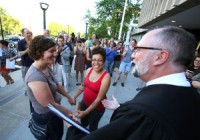 U.S. District Judge Barbara Crabb's recent ruling of Wisconsin's constitutional amendment banning same-sex marriage as unconstitutional has inspired me to write about the direction in which I would like to see my own field of "marriage and family therapy" go.
U.S. District Judge Barbara Crabb's recent ruling of Wisconsin's constitutional amendment banning same-sex marriage as unconstitutional has inspired me to write about the direction in which I would like to see my own field of "marriage and family therapy" go.
Too often I find myself saying to LGBTQ clients, "So if you can ignore the gender-normative and heteronormative aspects of this resource on strengthening relationships, it could be useful to you." For clients who are in polyamorous or open relationships, most of the couples therapy literature all but screams out, "You do not belong here!" or worse. But heterosexual, monogamous couples also lose out by the narrow depictions of sexuality and gender that are so common in this field and our society more generally. The case studies presented in couples therapy texts, for example, frequently refer to "husbands" and "wives," presuming that the individuals participating in marriages and other relationship formations define ourselves in these historically loaded terms. For many of us committed to gender equality, however, "wife" sounds more like a bad word than a role we freely choose to assume.
My point is that the sexual and gender binary frameworks that we use as shortcuts to describe human difference usually do more to limit than strengthen relational ties. For instance, statements about how (all) men prefer sex and activities to talking whereas (all) women feel that talking brings them closer to their partners do more to reinforce cultural stereotypes and dominant gender norms than to address what is actually going on between people in the present moment. As Kenji Yoshino beautifully articulated in Covering,
...the mainstream is a myth. With respect to any particular identity, the word 'mainstream' makes sense, as in the statement that straights are more mainstream than gays. Used generically, however, the word lacks meaning. Because human beings hold many identities, the mainstream is a shifting coalition, and none of us is entirely within it. As queer theorists have recognized, it is not normal to be completely normal. All of us struggle for self-expression; we all have covered selves.
Happily resources exist that ask us to inquire into the limiting beliefs and roles--including gendered and sexual ones--that get us into hot water in our relationships. One book that I've found to be particularly useful is David Richo's How to Be an Adult in Relationships. Although not explicitly queer, Richo's book draws on mindfulness principles and practices to challenge normative frameworks ("ego wishes and attachments," in his words) that thwart intimacy. As he writes,
Mindfulness is inherent in human nature. We were built to pay attention to reality. Indeed, paying attention is a survival technique. Over the years, though, we learn to escape and take refuge in illusory sanctuaries built by an ego frightened of reality. We notice that it is easier to believe what will make us feel better, and we feel entitled to expect that others will be what we need them to be. These are man-made chains that look like links to happiness. But...We do not have to put our dukes up. We do not have to become the pawns of our fixations or our fixed conceptions of reality. We do not have to find a pigeonhole...We can simply let things unfold, attending to reality as it is and staying through it as we are.
Richo's work provides avenues for waking up in our relationships, not digging our heels in to repeat patterns from our families and cultures, which often include rigid conceptions of gender, sexuality, and marriage. In its call for accepting our "here-and-now predicament," Richo's model also holds space for the address of oppression and domination. Thus we can still attend to the harms sustained by virtue of being a member of a marginalized social group within his mindfulness approach. But we do so with an intent of restoring dignity to each other and ourselves rather than retaliating and punishing others.
Mindfulness resources like Richo's offer a useful alternative to gender-normative, heteronormative, and monogamy-centric relational therapies that currently dominate the field of couples therapy. In fact, the focus on "paying attention and letting go" in his book serves as a reminder to be wary of "queer" or "LGBTQ" relational models that ultimately recreate the very exclusion they sought to contest via "fixed conceptions of reality." The challenge remains to use queer as a verb, not as a noun, so that we keep on uncovering the natural wholeness that is our birthright. To borrow from Rumi,“Your task is not to seek for love, but merely to seek and find all the barriers within yourself that you have built against it.”
